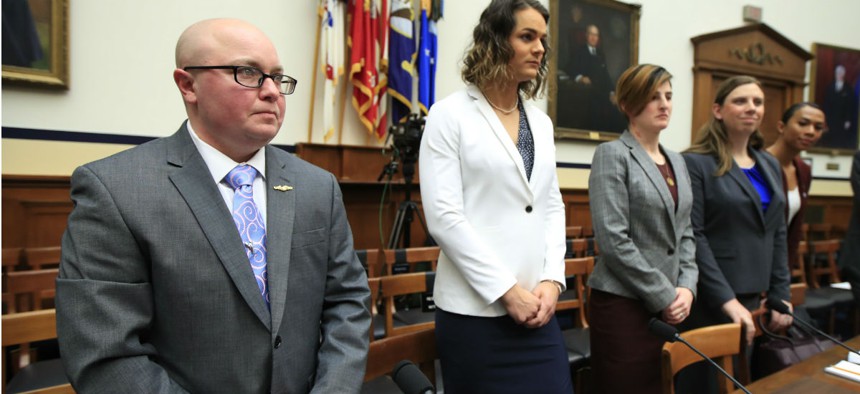Pentagon’s Fine-Tuned Transgender Policy Draws Flak
Though not a ban, Trump approach denies accommodations for "gender dysphoria."
Telegraphed a year ago, the Defense Department on Tuesday issued a directive unveiling its altered approach to handling transgender military service members, raising objections from lawmakers and advocacy organizations for LGBTQ people.
The new directive signed by acting Deputy Defense Secretary David Norquist allows service by transgender people who can meet the universal standards, but denies “special accommodations” for people with “gender dysphoria,” unless given a waiver.
Though current transgender service members are permitted to stay, the plan for the future largely undoes an Obama administration policy allowing transgender people to serve.
“No person, solely on the basis of his or her gender identity,” the plan said, “will be: Denied accession into the Military Services; Involuntarily separated or discharged from the Military Services; Denied reenlistment or continuation of service in the Military Services; or subjected to adverse action or mistreatment.”
However, transgender members or applicants “must be subject to the same standards as all other persons,” it qualified. “When a standard, requirement, or policy depends on whether the individual is a male or a female (e.g., medical fitness for duty; physical fitness and body fat standards; berthing, bathroom, and shower facilities; and uniform and grooming standards), all persons will be subject to the standard, requirement, or policy associated with their biological sex,” it continued. “Transgender persons may seek waivers or exceptions to these or any other standards, requirements, or policies on the same terms as any other person.”
It is to take effect April 12.
Under the Obama administration, Defense Secretary Ash Carter lifted the age-old ban on transgender troops in June 2016. Trump’s first Defense Secretary Jim Mattis produced a report recommending modifications, which was then challenged in the courts. A hearing was held on Feb. 27 by the House Armed Services Subcommittee on Military Personnel at which several transgender service members appeared.
In a March 13 explanatory statement, Deputy Public Affairs Officer Thomas Crosson stressed that the final policy “is not a ban.” The statement added, “Many transgender individuals already are serving honorably in uniform. Some are serving in their preferred gender, and many others are serving in their biological sex. These service members will not be asked to leave the military. DoD policy prohibits involuntary separation solely on the basis of gender identity, and it seeks to protect the privacy of transgender service members.”
But the new policy “is focused on enhancing readiness, and comes after consultation with military and medical experts,” the statement continued. “Persons with a history of gender dysphoria — a serious medical condition — and who have undergone certain medical treatment for gender dysphoria, such as cross-sex hormone therapy or sex reassignment surgery, or are unwilling or unable to meet the standards associated with their biological sex, could adversely impact unit readiness and combat effectiveness. For this reason, such persons are presumptively disqualified for service without a waiver.”
Hence the new policy “eliminates special accommodations that were provided to persons with gender dysphoria but not to others.”
Lawmakers, primarily Democrats, were highly critical. “It would be prudent for Acting Secretary Shanahan to delay implementing the Mattis policy until the courts have made their final determinations,” House Armed Services Committee Chairman Rep. Adam Smith, D-Wash., said. “Any other course of action not only undermines military readiness, but is also an insult to transgender individuals who have served and are still serving with distinction. Anyone who is qualified and willing should be allowed to serve their country openly. Make no mistake, this is a discriminatory ban on transgender people, not a ban on a medical condition, and we will continue to fight against this bigoted policy.”
On the Senate side, Armed Services panel ranking member Jack Reed, D-R.I., said, “The Pentagon should not move forward with this discriminatory and potentially unlawful plan to ban highly-qualified and skilled individuals from serving their country. It is disappointing that the Trump administration would take this action. It demonstrates again that President Trump puts politics ahead of national security and what is best for our troops.”
He cited legislation (S. 373) introduced with Sens. Kirsten Gillibrand, D-N.Y., and Susan Collins, R-Maine, to protect transgender troops.
Private groups cited a statement from the American Medical Association, released in July 2017, saying, “There is no medically valid reason to exclude transgender individuals from military service. AMA policy also supports public and private health insurance coverage for treatment of gender dysphoria as recommended by the patient's physician,” said President David Barbe. “According to the Rand study on the impact of transgender individuals in the military, the financial cost is a rounding error in the defense budget and should not be used as an excuse to deny patriotic Americans an opportunity to serve their country.”
Harper Jean Tobin, director of policy for the National Center for Transgender Equality, said in a statement, “The start of this looming purge represents an unprecedented step backward in the social and civil progress of our country and our military. Throughout our nation’s history, we have seen arbitrary barriers in our military replaced with inclusion and equal standards. This is the first time in American history such a step forward has been reversed, and it is a severe blow to the military and to the nation’s values.”




